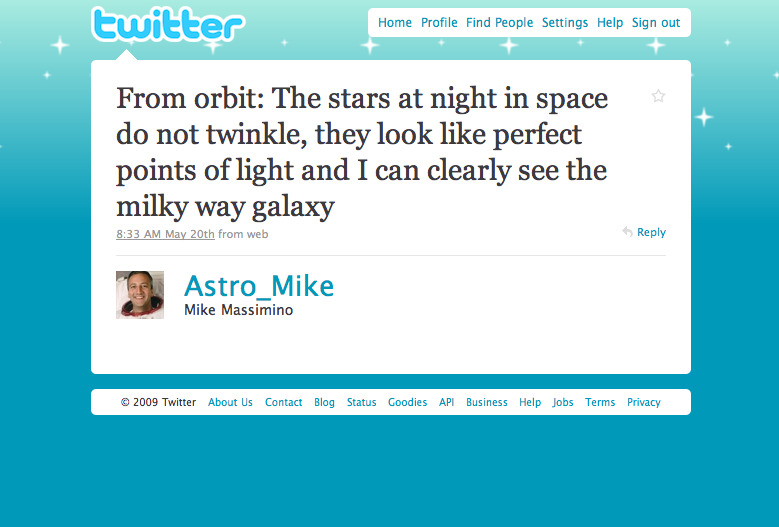NASA hosted our first tweet-up at the Kennedy Space Center in Florida, corresponding with the STS-129 Space Shuttle launch. Tweeters from around the world attended — from as far away as the UK, Morocco, and New Zealand. We exposed them to speakers who shared their experiences on what it takes to launch a Shuttle to what it’s like in space, with Twitternaut @Astro_Mike Massimino. We toured the facilities at the space center and took them out to see the Space Shuttle Atlantis on Launch Pad A.
Whew! Busy couple of days.
I’m still processing conversations from the STS-129 Launch Tweet-Up. Because we spent launch day at the press site, I crossed paths with a number of veteran reporters and cameramen — yes, most were men.
They found it “amusing” — to say the least — that we wanted to host a group of “twits.” Ar Ar Ar Ar. Think loud belly laughs and shared nods. (A modern version of their reaction would be fist-bumps.) We prefer the word, tweeps, thank you.
Here’s one common question: “What can you possibly say in 140 characters?”
My answer: A few well chosen words speak volumes. What about:
I love you.
You’re fired.
Thank you.
You’re free to go.
I’m pregnant. (I’m not. Just so you know.)
Here are a few words I tweet often. Reality check on our industry. We’ve been reluctant to let others see us sweat. So. I like to remind the twitterverse:
Space is HARD! We make it look easy.
But noone can tweet it better than @Astro_Mike Massimino, who is eloquent in his 140 character essays on life in space.
My point is simply this: 140 characters, crafted thoughtfully, can be life-changing. We, in the government AND media, are wedded to our wordiness. (Just look at some of the titles on our business cards.) We ensure nothing is left open to interpretation. We want the “last word” to close out the argument.
Twitter invites a conversation. Free form. No boundaries.
Is free-flowing conversation a risk? Sure. Isn’t it always? But, I think we call that democracy. Right? Freedom of speech? Twitter simply makes it global. And how cool is that!
Follow the living, breathing NASA STS-129 Tweet-Up conversation.
BTW, you can help @Astro_Mike win TWEET of the YEAR for his first tweet from space in Mashable’s Open Web Awards. Vote & vote often!
Cross post on www.bethbeck.wordpress.com.





Great work, NASA. And hey, after all that Twitter, are you writing shorter e-mails?
Yep. (Is that answer short enough?) 😉
I think Twitter gives us stuffy bureaucrats a face. We can’t hide behind a piece of paper with 25 signatures anymore. I believe the power of Twitter is “access” — the insider’s point of view. At least that’s what I want. What’s going on over there where I can’t see in?
…And that’s a scary thing for those of us protected by anonymity.
I like your word “tangy.” Twitter thrives on tang (and space too). Pls excuse my corny space humor. 😉
To boldly go…
To Adriel’s point, I am finding myself writing in shorter chunks everywhere, but the most notable change is in email. Being mobile forces that upon us and it will become increasingly the case that we are typing on small, handheld devices that will naturally limit the length of our language.
Could it be that one of the new, most important competencies is the ability to say a lot in a little? Will this style of writing begin to be taught in our schools? No longer sentence and paragraph, but power-packed, punchy phrases?
Will we all be relating by soundbite?
No answers, only more questions.
One-finger typing on my iPhone TOTally dictates brevity in email response. But I find people DM me (Twitter) or text me when I’m on the run.
Soundbite relationships? Not a bad way to go. At least it’s easy to remember…which doesn’t equate to memorable. 😉
Like David’s “To Boldly Go.” Few words, but they resonate with me. Hey, David…are you related to Picard?
Learned about this book today – 140 Characters: A Style Guide for the Short Form, by one of the Twitter creators. Haven’t yet read it so can’t say what I think, but intriguing.